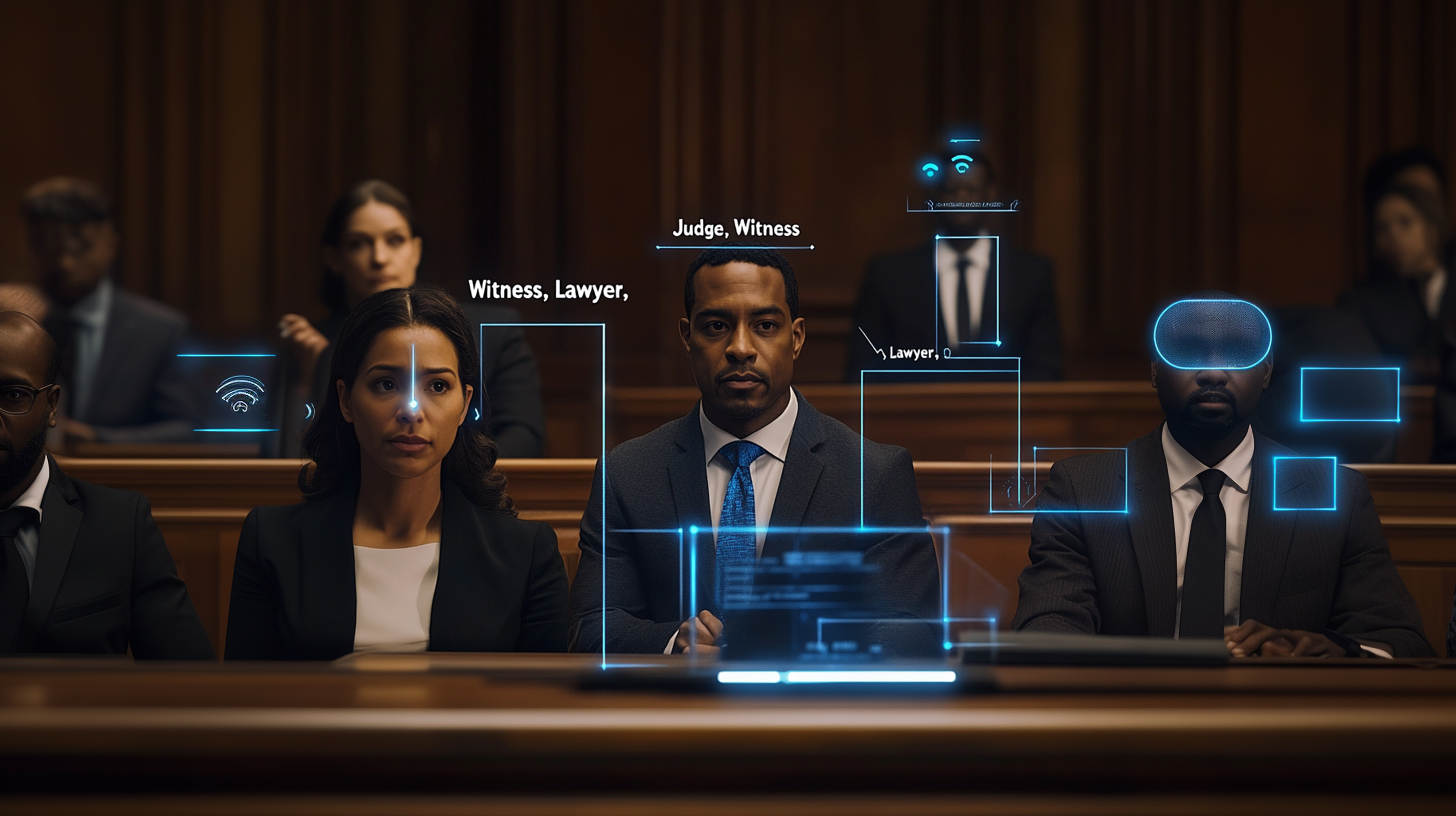5 Reasons to Incorporate Legal Software in 2025
In the legal world, where time and accuracy are of the essence, technology has become an indispensable ally. Incorporating legal software in your firm not only improves case management, but also optimizes workflow and significantly reduces repetitive manual tasks.
The legal sector is undergoing an unprecedented transformation thanks to technology. In a world where immediacy and efficiency are key, LegalTech (technology applied to law) has become a fundamental pillar for law firms. According to Legalario, in 2025 we will see a consolidation of digital tools that optimize processes, from document automation to artificial intelligence applied to case analysis.The legal sector is undergoing an unprecedented transformation thanks to technology. In a world where immediacy and efficiency are key, LegalTech (technology applied to law) has become a fundamental pillar for law firms. According to Legalario, in 2025 we will see a consolidation of digital tools that optimize processes, from document automation to artificial intelligence applied to case analysis.
This evolution not only responds to a need for modernization, but also to the growing demand from clients seeking more agile, accessible and personalized legal services. Digitalization is no longer optional: it is the standard that will make the difference between traditional law firms and those that manage to adapt to a more competitive environment.
In this context, the use of legal software has become a strategic advantage. Tools such as Probus allow lawyers to reduce document and hearing management time, access key information in seconds and improve collaboration with their team and clients. If you haven’t yet incorporated technology into your firm, here are five reasons why 2025 is the ideal time to do so.
Why is Legal Transcription essential?
Legal transcription is not just a technical tool; it is a necessity for any lawyer seeking accuracy, efficiency and effectiveness in their work. In legal practice, where every word can make a difference, having a reliable textual record ensures clarity, avoids misunderstandings and strengthens arguments.
Tools such as Probus make it possible to automate processes, speed up the search for information and improve collaboration between lawyers and attorneys. Here are five key reasons to incorporate legal software in your firm this year.
1. Saving time in Case Management
One of the biggest challenges in the practice of law is efficient time management. Legal software allows you to automate tasks that used to require hours of work, such as transcribing hearings or searching for information in lengthy documents.
With Probus, for example, you can upload a video of a trial or deposition and get an automatic transcript in minutes, saving more than 90% of the time that would normally be spent reviewing recordings. In addition, its powerful search engine allows you to find key terms and position yourself directly at the exact moment of the video, facilitating the analysis of the case.
2. Quick and accurate search for information
Quick access to relevant information is key to the preparation of any case. Legal software allows you to centralize and organize documents, transcripts and evidence in one place, avoiding loss of information and reducing search time.
With Probus, you can search within trial transcripts and across multiple cases at once, making it easy to reference key precedents or depositions without the need to manually review lengthy documents.
3. Increased security and confidentiality
Handling sensitive information is critical in the legal sector. Specialized software offers secure cloud storage with encryption protocols and restricted access, protecting client and case data.
Probus guarantees secure and private access to all information, allowing only authorized professionals to manage and share documents, without risk of loss or leaks.

4. Efficient collaboration with clients and team
Teamwork and fluid communication with clients are essential for the efficient management of a law firm. With legal software, lawyers can share documents, assign tasks and keep their clients updated without the need for face-to-face meetings or endless email exchanges.
Probus allows you to share cases with your team or clients, centralizing all information in a single environment. In addition, you can download transcripts in Word format with a single click and share them quickly and easily.
5. Competitive advantage and service improvement
In a highly competitive industry, offering fast and efficient service makes all the difference. Incorporating legal technology not only optimizes the firm’s operations, but also improves the client experience by providing agile responses and accessible documentation.
With tools like Probus, you can deliver documentation in less time, manage cases with greater accuracy and differentiate yourself from the competition with a modern and efficient service.
Conclusion
The use of legal software in law firms is no longer a trend of the future, but a reality of the present. Task automation, data management security and collaboration efficiency make tools like Probus essential for any legal professional in 2025.
If you are looking to optimize your time, improve case management and offer a more efficient service, now is the time to digitize your firm. Find out how Probus can transform the way you work and help you save time and improve your productivity.
Why is legal transcription a lawyer's best ally?
In the legal field, legal transcription has become an indispensable tool for lawyers and legal teams. It ensures accuracy in documenting hearings, depositions, interrogatories and other key processes. Having an accurate verbatim record helps to eliminate ambiguities and avoid misunderstandings, which are fundamental aspects of a sound legal strategy.
Why is Transcription Essential in the Legal Field?
Legal transcription is not just a technical tool; it is a necessity for any lawyer seeking accuracy, efficiency and effectiveness in their work. In legal practice, where every word can make a difference, having a reliable textual record ensures clarity, avoids misunderstandings and strengthens arguments.
When you work with transcribed documents, you can be sure that every detail, from hearing statements to interviews to interrogatories, is accurately captured. This not only improves the quality of your analysis, but also gives you a solid basis for arguing your case in court or any other legal venue.
Optimise analysis and save time
We all know how time-consuming it can be to review audio or video recordings. Legal transcripts simplify this process by providing an easily navigable text where you can search for key terms or specific phrases in a matter of seconds. This agility is invaluable, especially in complex cases with large volumes of information.
Moreover, transcripts not only save time, but also help you identify inconsistencies, strengthen your arguments and better structure your legal strategies. Instead of spending hours listening to audios, you can focus on what really matters: building a solid case.

How Legal Transcripts Boost Teamwork
Preparing a strong legal case involves more than just gathering information; it is essential to conduct strategic analysis that identifies key patterns, contradictions in testimony, and potential moves by the other party. Legal transcripts provide structured and accessible data, facilitating deeper and more detailed analysis of statements. This allows attorneys to extract valuable insights that strengthen their arguments and better prepare them for adverse scenarios.
In addition, transcripts are versatile tools that promote more efficient collaboration. Being in an easy-to-share format, they allow information to be quickly distributed among clients, colleagues, experts, and other key stakeholders. This ensures that everyone is working with accurate and up-to-date information, improving communication and speeding up decision-making.
- Inclusive Accessibility:
Text-based transcripts are highly accessible, allowing people with hearing disabilities to access information without barriers. This fosters a more equitable and collaborative work environment. - Ease of use:
Documents are presented in easy-to-use formats, such as Word, which makes editing and sharing between legal teams and clients simple. - Centralized communication:
All information about a case is available in one place, which avoids duplication and ensures that everyone is working with the same up-to-date data.
Economic and strategic advantages of subscription-based legal transcription software
Opting for subscription-based legal transcription software removes the barrier of an upfront cost, offering an affordable solution right out of the box. This model allows lawyers and legal teams to benefit from an efficient system that significantly reduces time spent on operational tasks, freeing up valuable hours to focus on more impactful strategic activities in their cases. In addition, by working with reliable verbatim transcripts, critical errors that could affect results are minimised, ensuring accuracy and confidence in the handling of information.
Improved productivity is another major benefit of this approach. With no upfront investment, legal teams can access an advanced tool that organises workflow and streamlines every stage of the process, from testimony review to litigation preparation. By avoiding high upfront costs, law firms can integrate this technology immediately and cost-effectively, ensuring a positive impact on both their bottom line and operating budget.
Probus: Legal Transcription Solution
In conclusion, legal transcription is not only a key tool for ensuring accuracy, efficiency and compliance in the legal field, but also a way to optimise case preparation, improve collaboration between professionals and embrace the benefits of technology integration in the sector. Probus, with its innovative artificial intelligence-based platform, elevates these benefits by providing fast, accurate transcription tailored to the needs of the modern lawyer. Its ability to process large volumes of data in minutes, identify speakers and enable search and editing of transcribed texts in a secure, collaborative environment makes it a revolutionary end-to-end solution. Thus, Probus not only simplifies daily work, but also enhances the strategic capacity of lawyers in an increasingly competitive and digitised legal environment.
Don’t miss out on the opportunity to integrate transcription technology today. automática en su despacho
Audio Transcription for Trials or Legal Hearings: Optimisation and Benefits
In recent years, speech recognition technology has gained ground in the legal field, providing lawyers, paralegals and other professionals with valuable tools to manage and analyse large volumes of spoken content from court recordings, depositions and client meetings. Legal professionals can now use advanced speech recognition software to transcribe audio files accurately and efficiently, ensuring that critical data is easily searchable and accessible. This technology addresses a common need in the legal industry for reliable, fast and secure methods to process large amounts of verbal information, saving time and improving productivity.
Why is Transcription Essential in the Legal Field?
Audio transcription is essential in the legal sector for several reasons. It allows an accurate record to be kept of what was said in trials or hearings, avoiding misunderstandings or misinterpretations. It also facilitates case review, as lawyers and solicitors can search for key terms and specific references, speeding up preparation for trials or appeals. Transcription also provides quick access to information, allowing the legal team to locate specific fragments without having to listen to lengthy full recordings. Finally, transcripts, in digital or hard copy format, are archived as official documents and can easily be presented in court or attached to legal files.
How Does Automatic Audio Transcription Work?
Audio transcription traditionally required human transcriptionists to manually listen and type word for word. Today, automatic transcription technology uses artificial intelligence (AI) to transcribe audio into text quickly and accurately. These tools recognise words, interpret sentences and detect pauses, allowing for highly accurate transcription in less time. AI-generated transcripts are complemented by speaker identification (recognition of who is speaking) and keyword search, features that optimise content review for legal teams.
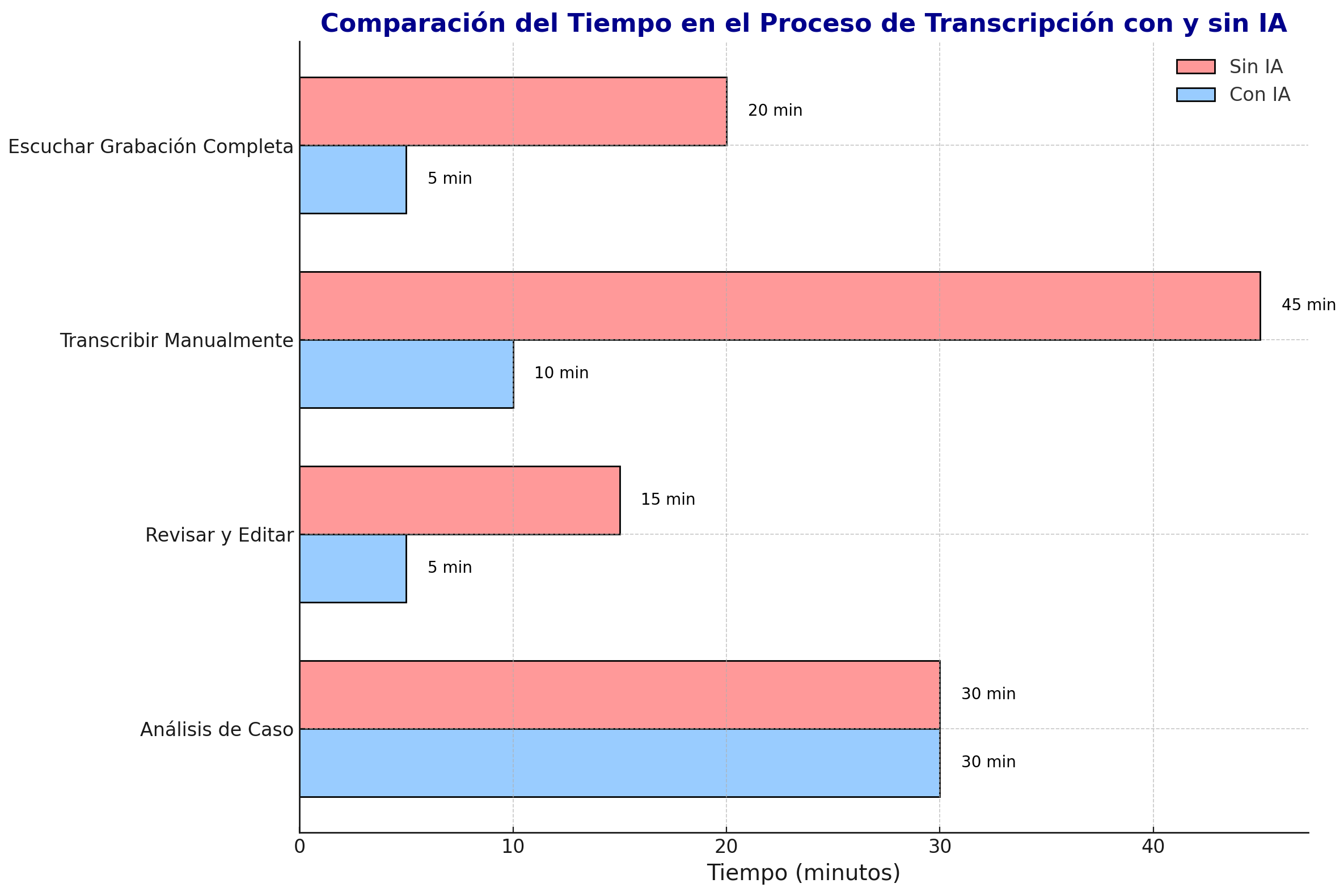
Advantages of Using Audio Transcription in Trials and Legal Hearings
Implementing an automated transcription system for trials and legal hearings brings significant benefits to legal professionals. Some of the main advantages include:
Time Savings: Automated transcription technology converts audio to text in a matter of minutes, allowing attorneys to focus on preparing legal strategy rather than manually transcribing.
Cost Reduction: By eliminating the need for manual transcription services, law firms can reduce operating expenses, as there is no need to hire staff dedicated solely to this task. Increased
Accessibility and Collaboration: Transcripts in digital format can be easily shared among team members, who can access the content from any device, at any time.
Ease of Search and Reference: With the integrated search capability, the legal team can quickly locate key words or phrases in the transcribed text, which is crucial when reviewing testimony or analysing depositions.
Use Cases for Audio Transcription in Trials and Legal Hearings
Audio transcription for trials has wide applications in the legal sector, some of which include:
Testimony Review: Lawyers can analyse witness statements and compare versions at different points in the legal process, identifying inconsistencies or details important to the case.
Appeals and Judicial Review: In appellate cases, having a complete transcript makes it easier to review previously presented arguments, allowing for a well-informed legal strategy.
Trial Preparation: Legal teams can use transcripts to study the positions of the parties and prepare effective cross-examinations or questionnaires, based on the exact words of each testimony.
Court References: In complex trials, lawyers can rely on transcripts to quote specific excerpts during their interventions, which can strengthen the presentation of the case.
Probus: Automated Legal Transcription Solution
For professionals looking for a reliable audio transcription solution for trials and legal hearings, Probus offers an advanced, customised platform for the legal sector. Probus employs cutting-edge AI technology to turn recordings into accurate transcripts in a matter of minutes, with search, speaker identification and secure cloud storage capabilities. This tool allows lawyers and solicitors to save time, reduce costs and easily access critical case information, optimising their resources and improving their productivity in managing legal cases.
In conclusion, audio transcription for trials is an essential tool for the legal field, and Probus provides a complete, effective solution designed specifically for the needs of legal professionals.
No pierda la oportunidad de integrar hoy mismo la tecnología de transcripción automática en su oficina.
Legal Speech Recognition: Transforming the Legal Landscape
In recent years, legal speech recognition technology has gained significant traction in the legal field, offering lawyers, paralegals, and other professionals valuable tools to manage and analyze large volumes of spoken content from court recordings, depositions, and client meetings. Legal professionals can now utilize advanced speech recognition software to transcribe audio files accurately and efficiently, ensuring critical data is easily searchable and accessible. This technology addresses a common need in the legal industry for reliable, quick, and secure methods to process large amounts of verbal information, saving time and enhancing productivity.
The Importance of Speech Recognition in Law
The legal sector handles extensive documentation, much of which is spoken. Whether through in-court testimonies, witness statements, or client interviews, professionals must capture and analyze verbal data. Traditional manual transcription, while thorough, is labor-intensive and time-consuming. Legal speech recognition software can reduce the transcription process to a fraction of the time required, allowing legal teams to redirect their focus to higher-priority tasks such as case analysis and strategy development.
With speech recognition, professionals can:
- Automate Transcription: Converting hours of audio into text within minutes.
- Search for Key Terms: Find specific terms or phrases instantly, navigating through hours of recordings efficiently.
- Secure Storage: Store transcriptions securely, ensuring data confidentiality and compliance with legal standards.
- Speaker Identification: Recognize different voices in a recording, which is especially useful in multi-party court hearings or depositions.
How Legal Speech Recognition Technology Works
The functionality behind legal speech recognition relies on Artificial Intelligence (AI) and Natural Language Processing (NLP), which allow systems to interpret and transcribe speech accurately. Unlike general transcription tools, legal-focused solutions are trained to recognize specific terminologies and contexts common in legal settings, enhancing both accuracy and relevance in transcripts.
Some advanced systems also feature speaker identification technology, distinguishing between multiple voices in a recording. This function is particularly valuable in court hearings or depositions, where accurately attributing statements to the right individual is essential for later review and analysis. The technology’s ability to add time stamps to transcriptions makes it easier for legal teams to find and revisit specific points in a conversation, providing added convenience for case preparation and courtroom reference.

Key Benefits of Legal Speech Recognition Technology
Time Efficiency: By transcribing recordings automatically, legal professionals save substantial time, enabling them to process more cases with reduced effort.
Increased Accuracy: Advanced AI algorithms ensure high accuracy, capturing legal-specific terms that general transcription tools might miss.
Enhanced Accessibility: Digitized transcriptions are easy to store, share, and retrieve, making them highly accessible to legal teams regardless of location.
Cost Savings: Automation reduces the need for human transcriptionists, which translates into lower operational costs over time.
Improved Case Management: Digital transcription and easy searchability support streamlined case management, making it easier for teams to collaborate and organize data.
Real-World Applications of Legal Speech Recognition
In practical terms, legal speech recognition is transforming workflows across various areas in the legal sector. Courtroom recordings can be transcribed automatically, providing attorneys with rapid access to trial records that can be searched and referenced as needed. Depositions and client interviews are also simplified with transcription tools that capture all critical spoken details, ready for analysis without the delay of manual transcription.
The technology also proves highly beneficial in collaborative environments, where legal teams work on cases from multiple locations. Digital transcription allows everyone involved to access, share, and review case files with ease, which is increasingly valuable as remote work continues to expand within the legal profession. This heightened accessibility not only streamlines case preparation but also strengthens communication among team members, enhancing the overall efficiency of legal operations.
Probus: A Comprehensive Solution for Legal Transcription
For legal professionals in search of a powerful, efficient transcription tool, Probus offers an advanced platform specifically designed to meet the demands of the legal field. Probus combines AI-powered transcription with features like keyword search, speaker identification, and secure cloud storage, making it an ideal solution for processing legal recordings. Users can upload audio or video files, receive accurate, time-stamped transcriptions in minutes, and share them seamlessly with team members or clients. With Probus, law firms can manage case data with ease and efficiency, enhancing productivity and simplifying collaborative workflows across legal teams.
Don’t miss the opportunity to integrate automatic transcription technology into your office today!
Is Online Audio-to-Text Transcription Reliable in Court Proceedings?
In the legal field, accuracy and reliability are essential. A small error in transcribing a statement or drafting a record can have major consequences in a case. With the increasing adoption of digital tools in law firms and courts, a frequently asked question is: is online audio-to-text transcription for legal proceedings reliable? In this article, we will explore the reliability levels of online transcription platforms, the associated risks, and the guarantees that these services must offer for use in the legal sector.
How do online audio-to-text transcription platforms work?
Online audio-to-text transcription platforms use artificial intelligence (AI) and natural language processing (NLP) to automatically convert voice recordings into text. These tools have improved significantly in recent years, reaching accuracy levels close to 90% or more in many cases, depending on the quality of the audio and the clarity of the voices.
However, when it comes to court proceedings, accuracy needs to be as high as possible, as details matter. Therefore, not all platforms are equally reliable for this type of task.
Factors that affect the reliability of online transcription
There are several factors that can influence the accuracy and reliability of online transcriptions. Below we review some of the most important ones:
- Audio quality: Audio clarity is crucial to obtaining an accurate transcription. Recordings with background noise, overlapping voices, or low-quality microphones can lead to significant errors in transcription.
- Legal terminology recognition: Many standard transcription platforms are not trained to handle specific legal language, which can lead to misunderstandings or errors in transcriptions. It is essential to use platforms designed for the legal sector that have databases of specialized terms.
- Support for multiple languages and dialects: In court proceedings where people from different regions may be involved, the ability of the tool to recognize different accents or dialects is key to maintaining accuracy.
- Manual correction and editing: Although AI platforms are fast and convenient, it is common for automatic transcriptions to require manual review to ensure complete accuracy, especially in legal contexts.
.

Risks of Using Untrustworthy Transcription Platforms
Using untrustworthy platforms for transcriptions in court proceedings can carry significant risks:
- Evidence errors: An incorrect transcription can change the meaning of a testimony or statement, which could affect the outcome of a trial or negotiation.
- Delays in the legal process: The need to manually correct errors or redo transcripts can cause significant delays in the processing of cases.
- Confidentiality issues: Many online platforms do not have the necessary security measures in place to protect sensitive information, which can compromise client privacy and case data.

What should a reliable platform for the legal sector offer?
To be suitable for use in court proceedings, an online transcription platform must meet certain quality and security standards. Here are some key features to look for:
- High accuracy: Platforms should offer accuracy rates close to 100% in legal settings. Many tools allow for a combination of AI and human review to achieve this level.
- Security and confidentiality: Data protection is vital in the legal sector. The service should have end-to-end encryption and comply with regulations such as the GDPR (General Data Protection Regulation) and other local data protection laws.
- Legal language training: It is essential that the platform is trained to correctly recognize and transcribe legal terminology.
- Multilingual support: In jurisdictions where multiple languages are spoken, the platform’s ability to handle different languages is crucial.
- Accessibility and ease of use: Users should be able to easily upload and access files, and transcripts should integrate efficiently with other case management systems.
Conclusion
Online audio-to-text transcription can be a fast and efficient solution for law firms and courts, but it is essential to choose reliable platforms, designed specifically for the legal sector. Accuracy, security and the ability to handle specialized terminology are non-negotiable when it comes to transcribing audio in court proceedings.
Probus: Reliable Automatic Transcriptions for the Legal Sector
If you are looking for a solution that meets these standards, Probus offers an advanced court audio transcription platform that guarantees accuracy, security and compatibility with your case management systems. Probus automates the transcription process, saving you time and allowing you to focus on what really matters: your client’s case.
Don’t miss the opportunity to integrate automatic transcription technology into your office today!
Best Artificial Intelligence Tools for Lawyers
The legal world is undergoing a transformation, and artificial intelligence (AI) for lawyers is playing a crucial role in this evolution. We will learn about some technological tools for lawyers that are optimizing processes, improving efficiency and offering innovative solutions for tasks that previously required a lot of time and effort.
Artificial Intelligence for lawyers not only makes legal practice easier, but it also allows professionals to focus on what really matters: delivering high-quality service to their clients and winning cases. Below, we will explore what the main applications of this technology are in law firms.
Contract Management: Intelligent Automation
Contract management is one of the most complex aspects within legal practice. Contracts must be drafted, reviewed, managed and fulfilled correctly, which used to require long hours of manual work. Thanks to artificial intelligence, there are now tools that automate these processes, allowing errors and the time spent on these tasks to be significantly reduced.
By using AI software for lawyers, firms can now automate the creation and review of contracts, detect risky clauses and ensure compliance with terms more efficiently. This optimizes productivity and allows lawyers to focus on other key aspects of their cases.
Legal Research and Predictive Analytics
Case law research and litigation predictive analytics are other areas where artificial intelligence is making a big difference. AI-based tools enable lawyers to conduct faster and more accurate research, providing results based on predictive analytics that can influence legal strategy.
These tools are able to analyze large volumes of legal data and offer patterns or predictions about the possible outcomes of litigation. This not only speeds up research, but also improves informed decision-making within law firms.
Legal Process Automation
One of the biggest advantages of technology for lawyers is the automation of administrative and repetitive tasks. AI tools enable law firms to automate document management, calendars, legal processes, and more. This automation not only saves time, but reduces human error and optimizes the firm’s operational efficiency.
For example, some software enables lawyers to automatically generate legal documents, perform real-time data analysis, and simplify routine tasks such as generating invoices or tracking procedural deadlines.

Electronic Signature and Document Management
E-signature and document management are essential in any legal process. Thanks to AI tools, lawyers can sign and manage documents securely and quickly from anywhere. In addition, these platforms ensure regulatory compliance and data security, which is essential in a legal environment.
This type of technology not only improves the speed of transactions, but also ensures that documents are protected against unauthorized access, which is vital when handling confidential information.
eDiscovery: Managing Large Volumes of Information
eDiscovery technology makes it possible to manage, analyze and filter large volumes of information in litigation processes. These tools, powered by AI, facilitate the search and organization of relevant documents, which previously required hours of manual review. This optimizes the discovery process, ensuring that key information is detected quickly and accurately.
Automation in Litigation Writing and Management
AI tools are also revolutionizing litigation writing and management. Automation allows lawyers to generate procedural documents more quickly, and some platforms offer detailed analysis on the most effective legal strategy based on historical data. This optimizes case preparation and can offer a competitive advantage in the court process.
Virtual Legal Assistants and Dispute Resolution
Virtual legal assistants are another innovation that is transforming the legal sector. These AI-based tools can offer automated legal advice, perform administrative tasks, and assist in the resolution of legal disputes more efficiently. By reducing the workload on routine tasks, lawyers can spend more time on strategic matters.

Knowledge Management and Operations Optimization
Knowledge management is vital in law firms. Thanks to AI tools, firms can easily organize, classify, and access the collective knowledge of the firm. This improves internal collaboration and facilitates access to crucial information in each case.
In addition, AI platforms offer detailed analysis to optimize time management and operational costs in the firm, resulting in greater profitability.
Probus and AI in Court Transcription
One of the areas where AI is proving to be especially useful is in the automated transcription of court hearings and other legal proceedings. This is where Probus comes into play. This AI transcription software allows lawyers and attorneys to automate the transcription of court recordings, saving time and reducing errors. In addition, Probus allows transcripts to be integrated into digital file management systems, making it easier to organize and access key legal information.
With the rise of artificial intelligence in the legal sector, tools like Probus are becoming an indispensable resource for lawyers looking to improve their operational efficiency and focus on the most strategic aspects of their work.
To learn more about all the tools, you can consult this guide Las Mejores Herramientas IA Para Abogados en 2025 (futurolegaltech.es)
Conclusion: AI, the Key to the Future of Legal Practice
Artificial intelligence for lawyers is redefining the way lawyers work, from contract management to process automation, legal research and court transcription. Tools like Probus demonstrate how technology can make legal practice more efficient, accurate and accessible.
Adopting technological solutions for lawyers is not only a competitive advantage, it is a necessity to be at the forefront in an increasingly dynamic sector. With AI as an ally, lawyers can dedicate themselves to what they do best: defending the interests of their clients and offering excellent service.
Software for Attorneys that Transforms Case Management
In today’s legal world, digitalization has become a key factor in improving efficiency and accuracy in case management. For solicitors, who must deal with large volumes of documentation, having specialized technological tools is not only an advantage, but a necessity. In this article, we will explore how digital transformation, and in particular, the use of solicitor software with automated transcription, has helped a solicitor’s firm to optimize its daily work.
The Case Management Challenge in Law Firms
Attorney’s offices handle multiple legal cases at the same time, resulting in a constant backlog of files, legal documents, and audio files that require transcription. Traditionally, this task has been manual, which consumes a significant amount of time and resources, and can lead to human error that impacts the progress of cases.
The Solution: Software for Attorneys
Probus is a tool created to facilitate efficient case management by automatically transcribing court recordings and other legal documents. Unlike manual methods, Probus automates the entire process of transcribing and archiving recordings, allowing attorneys to spend more time on higher-value tasks such as strategic case review and client service.
Case Study: Implementing a Solution in a Legal Firm
A Madrid-based legal firm, which handles an average of 50 cases per month, was faced with the challenge of manually transcribing long court sessions. In addition to the time required, the risk of making errors in transcription was high, which affected the agility of decision-making and case follow-up.
By implementing Probus, the firm experienced a significant transformation:
- Reduced Transcription Time: What previously took days of manual work was now completed in a matter of minutes thanks to automated transcription.
- Greater Accuracy in Legal Documents: Automation reduced the margin of error in transcriptions, which improved the quality of documentation delivered to courts and clients.
- Centralization of Information: Probus allowed all transcriptions to be centralized in a single digital platform, facilitating the search and management of files.

Key Results and Benefits
The implementation of this software for attorneys has been a clear example of how technological solutions for legal professionals can transform the way they work. Some of the most notable benefits include:
Time savings: A 70% reduction in the time spent transcribing documents was achieved.
Increased productivity: Attorneys were able to focus on reviewing and preparing cases, instead of wasting time on administrative tasks.
Centralized access: All transcribed information was available on a single platform, accessible to the entire team from anywhere.
Digital Transformation in the Legal Sector
Technology is redefining legal practice, and software for attorneys is at the forefront of this transformation. Probus, which not only saves time and reduces errors, but also allows for efficient case management.
Digitization is no longer an option, but a necessary step to stay competitive in an increasingly dynamic legal environment. Probus, with its focus on transcription automation and process optimization, is the ideal tool for any solicitor firm looking to improve its efficiency and offer a better service to its clients.
What Are the Advantages of Automated Transcriptions in Arbitration?
The implementation of advanced technologies has significantly transformed the field of arbitration. One of the most impactful innovations is automated arbitration transcription. This advancement not only improves efficiency in the management of arbitration hearings, but also offers multiple benefits in the digital administration and archiving of proceedings with software that we will discuss at the end of this article. We will explore the key advantages of automated transcriptions in the context of arbitration.
Accuracy and Efficiency with Automated Transcriptions
Automated transcriptions makes it possible to accurately capture every word and nuance during arbitration hearings. By using artificial intelligence and machine learning, these tools can produce real-time transcripts with remarkable accuracy. This eliminates or reduces the need for human transcribers, reducing costs and minimizing the risk of errors.
In addition, the efficiency of these technological solutions for arbitrations is remarkable. Automatic transcripts are generated quickly, allowing arbitrators and attorneys to access records almost immediately. This streamlines the review and analysis process, facilitating faster case resolution.
Improved Management of Arbitration Hearings
Arbitration hearing management benefits greatly from automated transcriptions. With these tools, all statements and deliberations are instantly recorded and transcribed, ensuring that every detail is accurately documented. This is crucial in complex arbitrations where every word can have a significant impact on the outcome of the case.
Platforms such as PROBUS that integrate automated transcriptions also offer advanced functionalities such as text searching and tagging. This enables lawyers and arbitrators to quickly locate relevant information within vast volumes of data, improving the preparation and presentation of arguments.
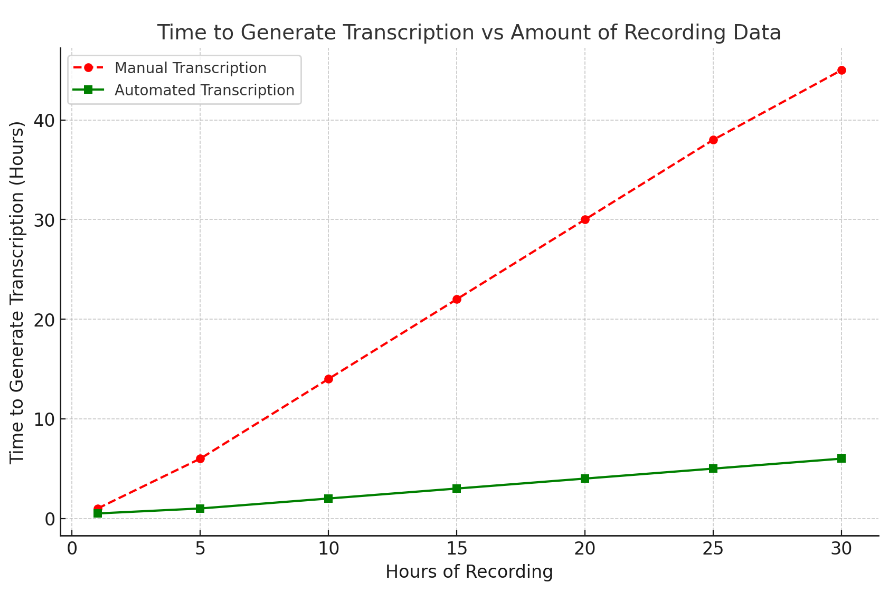
From: own sources
Digital Archiving of Arbitration Proceedings
The digital archiving of arbitration proceedings is greatly enhanced by automated transcription. By digitizing and organizing recordings and transcripts, these platforms allow for secure and accessible storage of all arbitration-related documents. Digital archives are easy to manage and protect, ensuring that confidential information remains secure and can be accessed when needed.
The ability to store and categorize transcripts and recordings also makes it easy to create a detailed history of each case. This not only helps in keeping track of current cases, but also provides a valuable resource for reference in future arbitrations.
Editing Arbitration Hearing Recordings
Editing arbitration hearing recordings is another area that benefits from automated transcriptions. Advanced tools allow users to edit, annotate, and highlight specific segments of the recordings. This is particularly useful for preparing summaries and presenting evidence in a clear and concise manner.
The ability to edit and annotate recordings improves case presentation, allowing attorneys to highlight the most important points and make their arguments more effectively. In addition, digital editing ensures that records are accurate and easy to understand for everyone involved.
Technology Solutions for Arbitrations
Technology solutions for arbitrations are transforming every aspect of the arbitration process. From recording and transcription to hearing management and digital archiving of proceedings, these technologies offer a robust infrastructure that improves efficiency and accuracy.
The adoption of automated transcriptions is just one part of a broader trend toward digitization and automation in the legal field. As more law firms and arbitrators adopt these technologies, the arbitration process becomes more streamlined, transparent and effective.

Conclusion
Automated transcriptions represent a significant advancement in the field of arbitration. By improving the accuracy and efficiency of recording and transcribing hearings, streamlining the digital management and archiving of proceedings, and facilitating the editing of recordings, these technologies are revolutionizing the way arbitrations are handled. Technological solutions such as PROBUS for arbitrations not only increase productivity, but also ensure greater transparency and accessibility, benefiting all parties involved. Digitalization is the future of arbitration, and automated transcriptions are at the forefront of this transformation.
The Future of Law: AI for Law Firms
Artificial intelligence (AI) is revolutionizing every industry, and the legal field is no exception. Law firms are beginning to harness the power of AI to automate routine processes, improve efficiency, reduce costs, and enhance accuracy in various areas of law. From contract review to predicting court outcomes, AI solutions for law firms are transforming the way lawyers work, streamlining repetitive tasks and leaving more time for strategic analysis and client engagement.
AI in Legal Process Automation
One of the main benefits that AI for Law Firms offers to law firms is the automation of routine tasks and administrative processes. AI software can analyze large volumes of legal documents, such as contracts and court cases, faster and more accurately than humans. This not only saves time, but also minimizes the margin for human error.
Some examples of automation include:
- Contract analysis: AI tools can review contracts and detect potentially problematic clauses or inconsistencies much more efficiently than a manual review.
- Legal research: AI platforms allow lawyers to conduct faster and more accurate research, extracting key information from databases of laws and case law.
The following data is from Wolter Kluwer’s Future Ready survey on AI and what lawyers think:
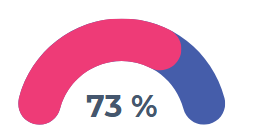
They hope to integrate AI in the next year
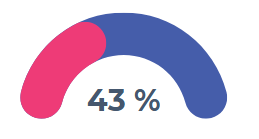
They see AI as an opportunity

They feel prepared for the impact of AI

They understand how to apply it in their work
Artificial Intelligence in Predicting Court Outcomes
AI’s ability to analyze large volumes of data is also helping law firms predict court outcomes. By analyzing thousands of previous cases and extracting patterns, AI can provide attorneys with a better understanding of the possible outcomes of a particular case, which helps in strategic decision-making.
This type of predictive analysis allows attorneys to have a clearer idea of the likelihood of success, the risks involved, and adjust their strategies based on accurate data.
AI and Court Recording Management: The Role of PROBUS
One of the most innovative areas in the use of AI for Law Firms is court recording management. This is where solutions like PROBUS come into play. PROBUS is an AI-powered platform specifically designed to efficiently organize, analyze, and manage court recordings. This allows attorneys to quickly access hearing and trial records, identifying key points in testimony or statements without having to listen to hours of recordings.
In addition, PROBUS easily integrates with other systems used in law firms, allowing for a seamless workflow and increased efficiency in legal document management.

In summary
Artificial intelligence is not only transforming law firms, it is also helping legal professionals make more informed decisions, automate tedious tasks and focus on what really matters: their clients and legal strategies. Solutions such as PROBUS are a clear example of how AI can make legal management more efficient and effective in an increasingly competitive environment.
Workflow Automation in large law firms: Benefits and Challenges
Lawyers and their teams face the pressure of managing large volumes of information and meeting tight deadlines. Workflow automation in law firms emerges as a powerful solution, enabling efficient management of legal files and optimizing various processes. Below, we explore the benefits and challenges of implementing these technologies in law firms.
Benefits of Legal Firm Automation
Efficient Management of Legal Files
Legal workflow automation enables efficient legal file management by centralizing information and facilitating quick access to relevant documents and data. Legal case management tools help organize documentation, avoiding information loss and improving accuracy.
Legal Process Optimization
Automating repetitive and administrative tasks frees up time for lawyers to focus on strategic and value-added activities. Legal process optimization reduces human error and improves work quality by standardizing procedures and ensuring compliance with regulations.


Challenges of Automation in large law firms
Resistance to Change
One of the biggest challenges is resistance to change on the part of staff within a work team. The implementation of new technologies can raise concerns about job security and the need to adapt to new systems.
Initial Investment
The initial cost of acquiring and customizing software solutions can be significant. However, this investment is often quickly recouped through improvements in efficiency and productivity.
Security and Confidentiality
Information security is critical in the legal arena. It is essential that automation solutions have robust data protection systems in place to safeguard the confidentiality of client information.
Software Solutions for Lawyers
Numerous software platforms are designed to assist lawyers in managing their daily tasks. These tools offer a variety of functions including document automation, case management, time tracking and billing, and secure client communication.
PROBUS: A Comprehensive Solution
For Automation in large law firms an outstanding solution in the market is PROBUS, an online platform for lawyers. PROBUS enables transcription, archiving and management of legal video and audio recordings.
PROBUS not only optimizes the efficient management of legal files, but also saves time, effort and money by taking advantage of the latest artificial intelligence technologies such as transcription, identification of intervening parties and keyword locator. By incorporating this tool, legal professionals can focus on their cases with greater effectiveness and less worry about administrative tasks.
Workflow automation in law firms represents a significant evolution toward efficiency and productivity. Although it presents certain challenges, the advantages far outweigh the difficulties, allowing law firms to offer a higher quality and more accurate service.





